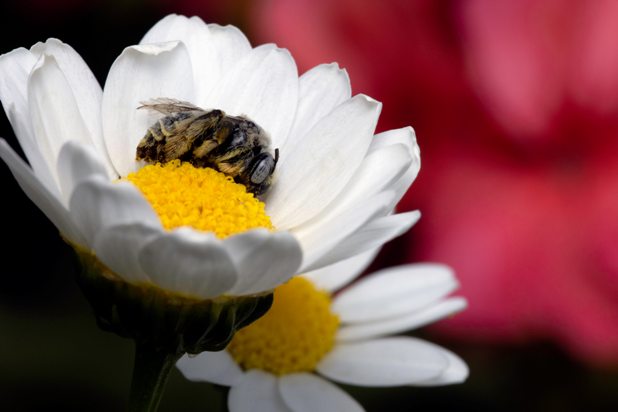Yes. Bees are known to rob your flowers of their beauty. Sleeping bumblebees or honeybees are the reason behind the unexplained holes in your flowers.
Like other insects, bees sleep too and flowers are their bed. And they sleep like a baby, taking on a perfect sleeping posture and restraining any movement. As a bee observer, I can say that bees are probably the most hard-working insects out there, which is why they are also heavy sleepers.
Wondering if they also sleep at night snuggled up in a bed like humans? Here’s your answer.
Do bees sleep at night?
Not necessarily. Most bees don’t sleep at night and wake up in the morning like humans. Their sleep pattern depends upon the role they play in the hive.
Only the Forager bees tend to sleep at night because they are the oldies of the group. You’ll often find these old-age bees sleeping in flowers peacefully at night. Honeybees don’t usually sleep at night; they sleep during the day whenever they are fatigued.

What about wasps? When do wasps sleep?
Wasps have a sleep cycle like humans.
They sleep at night after a day of hard work. But most wasps don’t sleep at all. They just get inactive during the night. Female wasps, however, hibernate for several months.
Read here: Do Bees Hibernate?
After spending the day outside, wasps return to their nest when the sun sets and stay dormant. They don’t fly when it’s dark outside. If you want to get rid of a wasp nest, it’s better to do it at night. If you get a spray for them, you’ll be able to attack each and every one of them at night.
Why do bees sleep?
When you don’t sleep well at night, your performance is never the same the next day.
Just like humans, bees need their sleep to perform well. Be it for their waggle dance or for generating honey, bees are unable to do their daily tasks if they are not well rested. Besides, if the bees are not rested, they would also disrupt the performance of other bees by leading them into the wrong direction.
While the older bees do not work hard, they also need sleep to keep their memory intact. And why do they need a good memory? Because they need to remember where they’ve kept their nectar and pollen.
Where do bees sleep?
It’s not something that I have observed closely. But I have read a couple of research papers, and according to Brandon Hopkins from Washington State University, honeybees prefer to sleep in their honeycomb while foragers find the flowers a comfortable space to sleep.
Why do bees make holes in the flowers or plants while sleeping?
I often get annoyed when I see holes in the plants placed in my garden. And I know those bees made the holes at night. From what I have read lately, bees poking holes in flowers or plants is a blessing in disguise. Here’s how.
When bumblebees hover around in your garden, they assess which plants or flowers need attention. Bumblebees can determine which flower contains more pollen and nectar. So, while they are checking out the flowers and their nectar, they are also determining which plant lacks flowers.
A discovery that stunned the bee researchers revealed that bees, especially bumblebees, that sleep in flowers, make small incisions or holes in the leaves to force plants to start flowering. They wouldn’t carry the small bits of leaves back to their nests or even ingest them.
Finally, when the researchers delved deep into the matter, they found out that bumblebees could actually aid plants to bloom with flowers a month earlier. Besides, it was discovered that bumblebees force plants to flower by poking holes in it only when they get pollen in excess. In the month of April, when plants are blooming enough, it’s observed that the bees don’t bite leaves as much.
Of what I have observed, there’s a give and take relationship between the bumblebees and the plants. Plants have pollen, which is the best food for bumblebees. And bumblebees can fertilize the flowers. Wondering how they stay in sync?
Well, the effort comes from bumblebees. They drill the holes in plants to help them flower early, which gives them their food on time further allowing them to fertilize the flowers.
You too want to know more about bees pushing plants to bloom? Check out this National Geographic article.
Do bees dream when they are sleeping in flowers?
No one got into the brains of bees! But we know that bees sleep, and they get sound sleep at night. That brings about the question of whether bees also dream like humans or not? It may be a passing thought for some but for the likes of me, it’s a topic of research.
Well, a study published in Science Direct demonstrated that even honeybees’ brains experience reactivation of memory when they are sleeping.
- The researchers used classical conditioning wherein they provided the bees with a context odor as a stimulus when they were trained while awake.
- The context odor was sprayed around individual bees when they were in deep sleep.
- Bees that were exposed to this particular odor displayed better retention memory as opposed to the bees that were not exposed to the odor.
Reception of the odor in deep sleep in bees indicates that they might also be able to dream like humans. Some day, if science allows, it’d be nice to know what the bees dream of!
Read here: